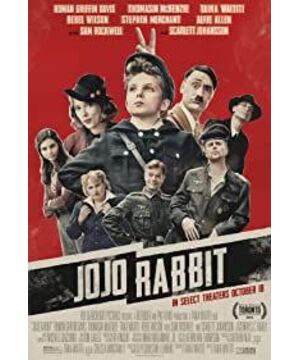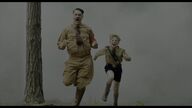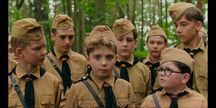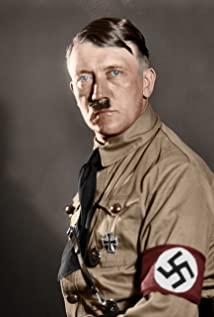(The film will be released on February 12) Taika Waititi is not a fuel-efficient lamp, so he shot the 1945 Third Reich in the movie "Jojo Rabbit" like spring. So gorgeous, I have to give him a thumbs up. Of course, he is not a fuel-efficient lamp. He couldn't hold back his loneliness. He glued on an exaggerated mustache and plunged into the mind of the little protagonist, Qiao Qiao. Whenever the 10-year-old got frustrated, he would pop out of his mind and enlighten him in a funny and playful way. That's right, the role played by our director Taika Waititi is the man whom Jojo admires most - Adolf Hitler! No one would use words like playful to describe the killer, just as no one would bring life to the streets of Germany in 1945, but Taika Waititi did. His uncharacteristic manipulation not only created one of the funniest Hitlers in history, but also set the tone for the movie - even though the background of the story is heavy enough to describe, even Jojo's mother was hanged by the brutal Nazis However, the film still uses a lighthearted and funny way of comedy, which makes people want to laugh when they are sad. It was a dangerous attempt by Taika Waititi, and he succeeded. So when we see the Führer lying on the bed of the little Nazi and the two chatting like good friends, we must be amazed at how well the color plays out throughout the film. This crew undoubtedly has a very good art director, no matter the costumes or the hidden details, the propulsive role they play in the plot is no less than the wonderful performances of the actors. Let's start with a color perspective and see how the film "revives" the lifeless Third Reich. Red, yellow and green - a splendid world of warm colors Yellow is a warm color, it is fresh and dynamic, and it has become the favorite color of many literary film directors. Kieslowski is very good at using the yellow filter, maybe you already learned it in his movie "Veronica's Double Life". In this "Jojo Rabbit", the sand-colored light yellow has become a basic color system that is almost "standard". It is the color of the German Youth League uniform worn by the little protagonist. . The German Youth League is a subsidiary organization of the Hitler Youth League, and its members are all 10-14 year olds. After reaching the age of 14, these teenagers were automatically upgraded to members of the "Hitler Youth". It's no wonder that when people see these children in yellow military uniforms gathered together, they immediately think of Wes Anderson's movie "Moonrise Kingdom". In this film, director Wes Anderson also used a lot of yellow filters. Also in yellow is Hitler, played by Taika Waititi. In Jojo's imagination, his head of state was still young and middle-aged, wearing a brown-yellow uniform of the Nazi stormtroopers. When the two "Minions" squeeze together and stare at each other, it has a comedic effect in itself. Most of the film's exterior scenes take place in a sunny world, and there are many yellowish buildings in the town. This small and fresh combination of high brightness and low saturation makes the film naturally present a kind of Positive style. Imagine a common WWII-themed movie, and wherever there are German towns in 1945, there are lead-grey skies and lifeless faces. The use of color can directly express the inner temperament of a film. Green is also a particularly favored color for the film, the exclusive color of the two brave women. From the appearance of Rosie, played by Scarlett Johansson, we noticed that she was wearing a mint green shirt and a pale green cardigan with a tawny pattern, beautiful and elegant. Green breeds hope, just like the mother in the movie, her real identity is an underground worker and a gravedigger of the Third Reich. Green symbolizes youth, just like the Jewish girl Elsa, when she regained her freedom, she was wearing the green sweater left by her sister Jojo, and she could finally dance unbridled in the sun. Green is also the color of the German Wehrmacht M36 uniform. Captain K always habitually opens his neckline. We will talk about this later. Green is also hiding in Jojo's "Nazi room", and the medium-green wardrobe has appeared in the camera many times, which is particularly conspicuous. You can think that this is a consideration by the art director to balance the color of the film, and you can believe that this is an icing on the cake. In addition, although red is not much inked in the film, it is very impactful every time it is used. It is the red swastika flag hanging on the streets, and the very romantic red cloak of the last Captain K. Of course, the most impressive and magical stroke is the cute red tin robot. With that silly bucket head and rectangular body, with the slogan of collecting pots and pans for the empire, who can not be stunned? You see, it's obviously a matter of forcing children to do coolies, but after Taika Waititi's crazy tossing, people can't help but clapp their hands. Numerous details - what determines the success or failure of this film After the color is finished, let's talk about the details. If the movie creates a colorful world, then these various details determine the success or failure of this world. In "Jojo Rabbit", there are a lot of characters who appear on stage. Among them, whether the protagonist or the supporting role, or even some tricks, their shapes are mostly lifelike, and the performance style also has the exaggerated or absurd colors of comedy movies. Scarlett's mint green dress has been mentioned earlier, but what really made the audience feel the pain was the pair of retro leather shoes under her feet. Rosie once angrily asked Jojo to take a good look at the people hanging on the gallows, but when the gallows reappeared, Jojo saw his mother's shoes. In a short set of shots, the director made two detailed echoes: once for the gallows and once for the shoes. On the riverside with green grass, Rosie once tied Jojo's shoelaces. Now, it's Jojo's turn to tie her dead mother's shoelaces. Tying shoelaces is a metaphor that marks Jojo's growth: he must say goodbye to an ignorant little boy and choose to be an adult. This also echoes the fact that he later ties his shoelaces to the Jewish girl he likes, Ilsa. Ilsa is not the monster with horns in the rumored head, but an out-and-out "rabbit", a "rabbit" who was "imprisoned" in a dark room. The rabbit is of course another important metaphor, and Jojo couldn't bear to kill the rabbit, and after some ideological struggle, he finally released it, which was probably the most important decision he made in his life. It released two Major signal: First, Qiaoqiao has kept the kindness in his heart since then. Even when faced with the threat of his Nazi beliefs, his first choice is still kindness; second, he buried the Jewish girl Ilsa for "freeing" the Jewish girl in the future. Foreshadowing. There is an ancient Chinese idiom called "Three Caves of the Cunning Rabbit". Ilsa told Jojo that she had changed several "caves" in order to survive. Jojo is not the rabbit, in front of the Russians who are no more merciful than the Germans, he is carried to the muzzle like a rabbit. The English name of the film is "Jojo Rabbit", maybe all those unarmed civilians in the war years are just that poor rabbit. It was not the Russians who "released" Jojo, but the captured Captain K. Ironically, if he hadn't "slandered" Jojo as a Jew, the Russians would have shot Jojo as a Nazi. Overnight, the Jews who were inferior to ants actually became the savior of the little Nazi Jojo. What a ridiculous echo this is. And Captain K is my favorite supporting role in the whole film. He is a real German with flesh and blood, and the film also shows the complex inner heart of this German soldier through a series of insignificant details. From his first appearance, we noticed the open neckline on his M36 uniform. The military discipline of the Third Reich is extremely strict, so unscrupulous, if discovered by the German military police, they will definitely be punished. And he still goes his own way, which shows that his heart has been numb, and he no longer has any hope for this war. This gave him a more convincing motive for letting go of Ilsa and saving Jojo afterward. As for the exaggerated red cloak and the red tassels on the M36 steel helmet, it pushed the romantic complex in Captain K's heart to the extreme. This is definitely a man who is thoughtful and knows how to enjoy life, and there seems to be some ambiguity beyond friendship between him and his loyal adjutant. It is a pity that he was born in a cruel war era, which was the fate that millions of Germans could not escape at that time, and the irreversible crime and punishment. Such a star-like detail can still be caught several times. Even in some almost dragon-like roles, the director did not forget to "echo before and after." The five men in black, the Gestapo, were also quite impressive. The eldest was a thin and tall man, and the four dwarfs surrounded him tightly. And when they reappeared, the Allies had already captured the town, and these bad guys all took off their black suits, which symbolized their status, and changed into different colors, intending to pretend to be civilians and escape. This is a very realistic scene, and how many cunning devils escaped the sanctions of war is hard to measure. And that fat woman, known as the female secretary who gave birth to 18 boys in the country, dramatically became the representative of "the beasts are still fighting". Not only did she turn the child into a human bomb, but she almost killed Jojo, who didn't want to fight. Under the brainwashing of the propaganda machine of the Third Reich, she has completely lost her mind. At the last moment, she even picked up an MG machine gun and rushed to the battlefield filled with gunpowder... I remembered the conversation between Ilsa and Rosie again. When Rosie reluctantly told Ilsa that Jojo's thoughts were a little extreme, she must have fallen into deep confusion. Judging from her way of life and her words of encouragement to Ilsa, everyone understands that she is a good mother who is gentle, wise and brave. But such a good mother, why can't she stop her son from becoming a Nazi? I think this is a hidden question thrown by Taika Waititi, and it deserves our deep reflection. But no matter what, keeping the goodness in your heart is always the bottom line of being born as a human being. As Taika Waititi said in an interview - "May we be able to destroy ignorance with love." I hope everyone can be like Jojo, facing the lingering devil in their hearts and bravely say to it Out - "Fuck off"! I was reminded of the conversation between Ilsa and Rosie again. When Rosie reluctantly told Ilsa that Jojo's thoughts were a little extreme, she must have fallen into deep confusion. Judging from her way of life and her words of encouragement to Ilsa, everyone understands that she is a good mother who is gentle, wise and brave. But such a good mother, why can't she stop her son from becoming a Nazi? I think this is a hidden question thrown by Taika Waititi, and it deserves our deep reflection. But no matter what, keeping the goodness in your heart is always the bottom line of being born as a human being. As Taika Waititi said in an interview - "May we be able to destroy ignorance with love." I hope everyone can be like Jojo, facing the lingering devil in their hearts and bravely say to it Out - "Fuck off"! I was reminded of the conversation between Ilsa and Rosie again. When Rosie reluctantly told Ilsa that Jojo's thoughts were a little extreme, she must have fallen into deep confusion. Judging from her way of life and her words of encouragement to Ilsa, everyone understands that she is a good mother who is gentle, wise and brave. But such a good mother, why can't she stop her son from becoming a Nazi? I think this is a hidden question thrown by Taika Waititi, and it deserves our deep reflection. But no matter what, keeping the goodness in your heart is always the bottom line of being born as a human being. As Taika Waititi said in an interview - "May we be able to destroy ignorance with love." I hope everyone can be like Jojo, facing the lingering devil in their hearts and bravely say to it Out - "Fuck off"!
View more about Jojo Rabbit reviews











